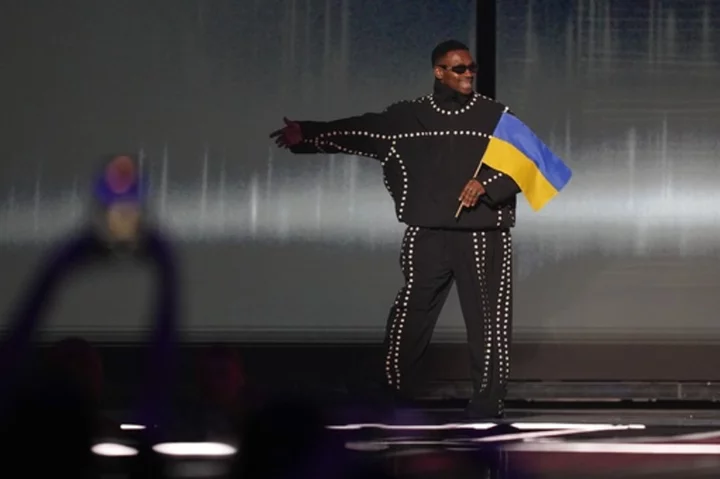LIVERPOOL, England (AP) — This weekend’s Eurovision Song Contest is taking place in a city brimming with Ukrainian flags, Ukrainian food, Ukrainian musicians and Ukrainian fans: Liverpool.
The English port city that gave the world The Beatles is using the contest to offer displaced Ukrainians a taste of home —- free from war, and glittering with sequins and sparkle.
Britain is hosting the glitzy pan-continental music competition for the first time in 25 years after stepping in to hold it on behalf of last year’s winner, Ukraine. Organizers have vowed to make the event a celebration of Ukrainian spirit and culture.
“I want all life to be like this – whole life Eurovision village, and whole life Eurovision celebration,” said Daryna Borodaikevych, 29, one of more than 200,000 Ukrainians who have moved to Britain since Russia invaded its neighbor almost 15 months ago.
“Whole life united by music,” she added, echoing the motto of this year’s Eurovision competition.
The contest's live final show at the Liverpool Arena on Saturday was planned to have a distinctly Ukrainian flavor. Co-hosted by Ukrainian singer Julia Sanina, it will feature a performance by last year’s Eurovision winner, Kalush Orchestra, and other Ukrainian performers. Images of Ukraine will precede each of the 26 performances by acts representing nations from across Europe and beyond.
Sanina said Friday that she hoped "that in these dark times we bring some joy and some light to Ukrainian homes and families."
Eurovision is Europe's biggest musical party, and tens of thousands of music fans have flocked to Liverpool, which won a competition among U.K. cities to stand in for Ukraine. The city on the River Mersey has thrown itself into the party spirit, with many pubs and venues holding Eurovision parties.
Businesses fly blue and yellow Ukrainian flags, and a Ukrainian village inside the waterfront Eurovision fan zone dishes out borsch soup and varenyky — potato-filled dumplings — alongside lessons in Ukrainian art and history.
“We feel like (we’re) at home in Ukraine,” said Iryna Schcerbuk, 30, of Kyiv, who came from her new home in southeast England to watch Thursday’s Eurovision semifinal. “It’s a very beautiful atmosphere.”
One thing missing will be Ukraine’s leader, President Volodymyr Zelenskyy. Eurovision organizers say they turned down his request to make a video address to Saturday's contest final. The European Broadcasting Union, a grouping of national public broadcasters that runs Eurovision, said that letting Zelenskyy participate would breach “the nonpolitical nature of the event.”
Zelenskyy’s request “to address the audience at the Eurovision Song Contest, whilst made with laudable intentions, regrettably cannot be granted by the European Broadcasting Union management as it would be against the rules of the event,” the organization said.
Zelenskyy spokesman Sergii Nykyforov denied that the president had asked to speak to the event, which will be watched by an estimated 160 million people.
“The Office of the President of Ukraine did not address the organizers of the Eurovision Song Contest to offer (Zelenskyy’s) online performance during the finals or at any other stage of the contest,” Nykyforov said on Facebook.
During Russia's invasion and war, Zelenskyy has addressed dozens of global gatherings to promote his country’s cause. He has spoken to legislatures around the world by video — and a few times in person — and appealed to crowds at the Glastonbury music festival, the Grammy Awards and the Berlin Film Festival.
But he reportedly was denied permission to speak at the Academy Awards in March, and Ukraine says that FIFA, international soccer’s governing body, also refused Zelenskyy’s request to send a video message to the World Cup in November 2022.
Founded in 1956 to help heal a continent shattered by war, Eurovision strives to keep pop and politics separate. Overtly political lyrics, signs and symbols are banned.
But politics can’t be shut out entirely. Russia was banned from the contest after it invaded Ukraine in February 2022. Belarus was kicked out the previous year over its government’s clampdown on dissent.
British Prime Minister Rishi Sunak’s spokesman said the U.K. government was “disappointed” by Eurovision organizers' decision, though there were no plans to challenge it.
“The values and freedoms that President Zelenskyy and the people of Ukraine are fighting for are not political, they’re fundamental,” Sunak spokesman Max Blain said.
Liverpool is a city that has known its share of hardship. It weathered World War II bombing, the decline of its once-bustling docks and mass unemployment before reinventing itself as a center for culture and nightlife. It's a story of resilience that strikes a chord with many Ukrainians.
“Obviously, all of the Ukrainians would have preferred for this to have been hosted in Ukraine, if it was safe,” Maria Romanenko, who has taken more than 200 people on Ukrainian-language walking tours of Liverpool in recent days, said.
“But we are based in the U.K., now, until Ukraine wins, and we are just glad that we can come to Liverpool,” she added. “It feels absolutely fantastic to see all of the flags and all of the stuff that has been rolled out.”
Borodaikevych, who joined one of the tours, said she appreciated the chance created by Eurovision to “feel support, feel a little bit special maybe. To hear lots of Ukrainian language – I miss it so much."
“It’s a celebration, but I can’t be relaxed 100%.,” she said. “I am always thinking about my people and my homeland.”
___
Follow AP coverage of Eurovision at https://apnews.com/hub/eurovision-song-contest and of the war in Ukraine at https://apnews.com/hub/russia-ukraine

